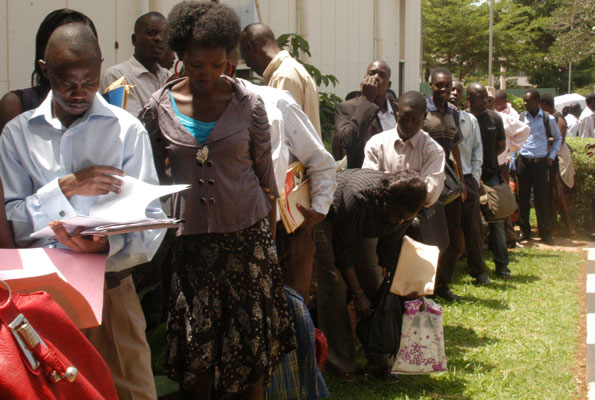
According to the Uganda Bureau of Statistics figures, every two of five people don’t have a job. This is worse among the youth where the unemployment rate is the highest in the region.
As a result, there has been a massive influx of youth from Uganda to several Middle East countries such as Saudi Arabia, the United Arab Emirates, Oman, Qatar among others and for those who remain home, most have been condemned to sports betting, gambling, theft among other social evils.
According to a Twaweza East Africa research dubbed Sauti Za Wanachi, Ugandans who have been found to be unemployed have also been found to be a lazy lot.
The survey states that if Ugandans were segmented into four income categories, more than one quarter 27 per cent of Ugandans feel they are the poorest in Uganda.
Although they attribute their state to neglect from the government that has not provided jobs and other income generating opportunities, other respondents feel that poverty especially among the young has been a function of laziness.
When asked why Ugandans think some people are poorer than others, interestingly, most of them, or 54 percent said it is laziness or lack of effort at improving their incomes.
The survey which covered 1925 respondents countrywide, another 39 percent of Ugandans consider themselves medium income, while 7 percent feel they are among the richest Ugandans.
Informal sector
In the light of lack of formal employment, most youth have resorted into creating jobs for themselves and as a result, earning an income for themselves.
In his address, President Yoweri Museveni, noted that several Ugandans were not only unemployed, they are also unemployable because they are not skilled in any particular area.
“We now have the money, if prioritization is correct; to launch a serious assault on the poverty and hopelessness that renders our Bazukulu [youth] vulnerable to manipulation and exploitation by unprincipled politicians. I have proof of this which I will bring out at the right moment,” the president said.
According to Museveni, youth should be engaged in activities such as shoes making, cloth weaving, knitting, embroidery, confectionery, beautician skill in order to benefit from the projects that the government has put in place to financially empower them.
“These types of projects are being done or will be done by our educated youth (scientists), foreign investors or some of our local business people converting from importing to import- substitution and export promotion,” he added.
But as most youth would argue, there is a lot that still needs to be done on the side of government.
Agnes Kirabo, the Executive Director, Food Rights Alliance for example argues that although there is a lot lacking in the ingenuity of Ugandan youth, the government has also failed implementing her mandate especially in the areas of youth empowerment.
‘Look at what happened to the maize farmers. They people planted maize, it did well, but the prices plunged and the farmers lost’, she says. ‘Would you say they are lazy?’
Close to one third of Ugandans or 29 percent say the some households in Uganda are poor because there is too much injustice in the society, while 11 percent cite lack of unemployment.
But holding other factors constant, 95 per cent of Ugandans know that the rich-poor gap in society is too wide and that the government has the responsibility to reduce it.
41 per cent of the respondents want the government to provide quality education and free health care for all, if income inequality is to be reduced whereas more than a third urged government to reduce on taxes on small business so as to leave operators with more profits and allow that business to survive.
According to Betty Kamya, the minister for Kampala where most of the unemployed youth and startups are located says that the government cannot bear the burden for its poor youth who don’t want to move a muscle.
These “poor voters” used to pay graduated tax; they drink alcohol daily, marry several wives, contribute to communal events like funerals, weddings, “ettoffaali”, and pay hefty sums to witch doctors! If a household of eight cannot pick one wild mango in a month to raise money for themselves; what can they ever do?
Kamya added that the ‘so-called’ educated Ugandans are the hardest to govern because they are lazy; they despise work and celebrate mediocrity.
“Africans relish bad luck because they get loads of pity and time off work. We wallow in self-pity at losses and must be seen to mourn because everybody is on high-alert to smother us with pity and understanding,” she added.
Museveni blamed the influx of Ugandan youth to the Middle East on the failure by the Ministry of Labour to create functional structures in Uganda that allow for youth to thrive.
“The Ministry of Labour is letting us down here by allowing businessmen to exploit our youth by charging each youth between Shs2 and 8million to be allowed to access a job outside. This is too much. I have already picked this up and I will resolve it. I prefer local jobs,” he said.